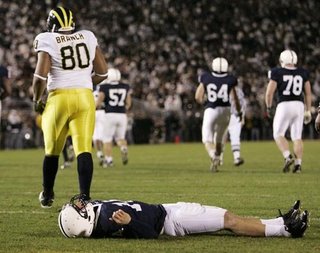 If they say we partied,
If they say we partied,
then I'm pretty sure we partied.
It may be
tres speedy and throw killer parties, but we don't need the Outback Bowl. We get the Rose Bowl, which is great. A few days of monkish meditation have led me to the following conclusions.
This is a pro-Michigan case for Florida playing in the national championship game.
Observation 1: There is no meaningful way to distinguish these teams' strengths of schedule. A win over Notre Dame, a perennial toothless tiger, contributed something to conference strength -- a nonconference opponent who'll finish at 10-3 in the 15-20 ranking range is nothing to scoff at -- but let's not exaggerate. Wisconsin, 11-1, was tested only once all season, by Michigan. We won't know about them until they play Arkansas. The biggest bonus point goes to playing a close game toward Ohio State, on turf that resembled a sinkhole. There's no point in braying about the closeness of that game, but it was hard-fought, manful and mildly flukey. Any schedule-strength reservations implicit in the fact of a loss are outweighed by Ohio State's overall quality and its unwieldy facilities. Wasn't exactly going up against the Miz and Abe in a
Real World-Road Rules Inferno, but the schedule strength was solid.
Florida? The best win was against LSU. Respect the Arkansas win, but Arkansas clearly is an idiot savant: its running game can perform complex string theory calculations but the rest of the team spills Kool-Aid on its trousers and carries a druel cup. It had the inglorious loss to 10-2 Auburn, but there was the win on the road against Tennessee early in the season, just after Tennessee crushed Cal and looked like it might be a hegemon.
LSU (10-2), Tennessee (9-3) and Auburn (10-2) were tougher as a trio than Notre Dame (10-2), Wisconsin (11-1) and Ohio State (12-0). Michigan made up the margin because the second-tier Big 10 teams -- Penn State (8-4), Iowa (6-6) and Minnesota (6-6, but worse) -- are a hair better than this year's second-tier SEC teams -- Georgia (8-4), South Carolina (7-5) and 'Bama (6-6, but worse). (Disagree? Fair enough. I'm not being absolute. We'll have better answers once bowl season wraps.) As my friend
the Watchman pointed out, one of Michigan's non-conference creampuffs, Central Michigan, went on to win its conference. Yes, it was the MAC, and there's no point in exaggerating the merit to that, but it's not hot garbage, either.
Point being, Florida's best opponents were overall a little better than Michigan's, which were solid overall, but Michigan's second-tier opponents were a little better than Florida's, which were solid overall, and while you can argue along the margins, there isn't a clear-cut case to be made for either side. More numbers: As pointed out by commentor Tommy O, Florida's 12 Division I-A opponents had a combined record of 89-57. Michigan's 12 opponents had a combined record of 84-61. Difference: Marginal.
Sagarin strength of schedule rankings: Michigan 13, Florida 19. Difference: Marginal.
You don't have to buy my argument in full. Maybe you think one team had a slightly harder schedule, but I suspect that, after an honest, detached assessment, you have a hard time arriving to a strong conclusion either way. If it's not on one hand, it's on the other, and this is not the stuff to make for a convincing fight.
Observation 2: There is something to be said for style points. They don't tell you everything and they're not absolute, either. OSU in 2002 didn't have style points, they just won a lot of close games. That doesn't denigrate that team's legacy. Likewise, if Florida somehow beats Ohio State, no one's going to care about what happened against South Carolina. People will just remember Florida as the team that beat Ohio State.
Urban Meyer spent time arguing against the consideration of "style points." That was a nifty piece of
Frank Luntz-like wordsmithing that downgraded the concept of quality wins into a beauty pageant category. The issue isn't style points, it's quality of wins. Meyer's framing invites you to conclude that a one-point win arising out of an opponent's missed field goal equals a 26-point win on the road against a team then ranked No. 2 in the country. Or, to draw from a different sport, to conclude that a pitcher who throws a perfect game is no different from one who allows seven runs but has an offense that scores 12.
There's a reason that most pro-Michigan arguments arise under this framework: Michigan dominates it, the way it dominated every non-Ohio State team this season. Before Ohio State, no Michigan game in 2006 was ever close, ever. Penn State scored a fourth-quarter touchdown on a fluke, after Michigan administered concussions to its first- and second-string quarterbacks. The 34-26 Ball State score has been a source of cheap shots looking to knock the Michigan team, all of which neglect to recognize that Michigan -- playing a season without a single bye week -- elected to pull its starting defense in order to save its reserve and give the second- and third-stringers some playing time. It was, at worse, a risky human resources decision. Michigan's
full season record is here.
Florida? There was the November 11,
18-17 win against South Carolina that arose only because South Carolina kicker Ryan Succop missed a field goal. Or three. September 16: A
21-20 win on the road against Tennessee. October 15: a
27-17 loss at Auburn. November 4: An anemic
25-19 win against Vanderbilt, which outgained Florida and happened to be a team that Michigan throttled on Labor Day weekend. November 25: a lackluster
21-14 win against a craptacular Florida State team, in a game that was tied 14-14 going into the fourth quarter.
There is certainly nothing wrong or disturbing about these wins. I watched the South Carolina, Tennessee, Auburn and Florida State games. Only in the Florida State game did it occur to me that Florida fields a wobbly team, but it wasn't a revelation, just more of a murmur. These games often turn on tight margins and are dictated by unpredictable variables. Observing that Florida often won ugly, while Michigan played roughly comparable teams and dominated them, isn't a bash on Florida. The only obvious yardstick is Vanderbilt, a team so shaky that it's unfair to use it as a platform for drawing comparisons.
For all we know, Michigan could have struggled against these teams. But the point is that they didn't struggle. Once. All season. They arm-wrestled 12-0 Ohio State through the final possession. Florida arm-wrestled through the final possession against 6-6 Florida State and 7-5 South Carolina.
Observation 3: Despite Observations 1 and 2, Michigan did, in fact, have its shot, and it failed. I don't know why this argument doesn't have more salience for my fellow Michigan fans. Any re-match would be a fluke, not a birthright. If the shoe were on the other foot, we'd be arguing that we defeated an extremely talented team, and that it's substantively unfair and procedurally incorrect to be forced into a rematch.
See also Double Jeopardy.
I know the BCS rules don't forbid rematches, but that's not the point. The rules don't forbid a 5-7 team from being voted number one, either. As much as I think Michigan trounces Florida in a "style points" debate, the broad Michigan-Florida parity and the fact that Michigan had, in fact, lost to its prospective national champinoship opponent are enough to justify voting for Florida.
Most Michigan fans tend to be highly critical of their team -- when something goes wrong, the first impulse is to blame yourself. Here, we can't complain about injustice when we didn't win the first time. The outcome was under Michigan's control, and, by the thinnest of margins, it went the other way. Good night and sleep tight.
Observation 4: Ultimately, Florida was the least-painful alternative. So, I understand why a detached voter would choose Florida above Michigan. The standard reply to my argument so far would be, "The BCS is supposed to pit the number one team against the number two team. Your position relies too much on aversion to a re-match."
A.)
See Observation 5, below.
B.) How many times have you voted
against a candidate, as opposed to voting
for one? How many times have you watched a Thursday night MAC game because it's better than
Friends? People make choices based on many variables. When two teams are as relatively close on paper as Michigan and Florida, avoiding a rematch between the Big 10 teams (or, as Meyer would phrase it, giving Florida its chance) strikes me as a perfectly fair and equitable consideration. This would not be the case if we were talking about two-loss LSU, or mid-major Boise State. But that's not what we're talking about. And for the reasons set forth at Observation 5, it's not just because of some ineffable notion of justice.
Observation 5: There are strong merits behind a final non-conference test. I don't understand why the key argument for Florida supporters isn't the following: Sure, it's tough to decide between these two teams, but for the sake of the integrity of the title determination, isn't it important that both Michigan and Ohio State are tested by a non-conference opponent? It isn't so much that a rematch is per se bad or somehow violative of competitive spirit. (Consider a rematch in a conference title game. Team B beat Team A in early October. In the conference championship, Team A beats Team B. No one should contest that Team A is the conference champ.) The problem is that you'd have two teams who haven't been tested by elite non-conference opponents since September. Without a test from a non-Big 10 team, you have no clear way of judging that Michigan and Ohio State are superior to this year's other elite teams. Instead, you have a somewhat incestuous scenario where Michigan ranks number two because it played a close game against its own intraconference rival.
If Ohio State beats Florida, it helps Michigan's legacy as a quality team. If Michigan beats USC and Ohio State somehow loses, the result strengthen's Ohio State's legacy. If, as I suspect will happen, both Michigan and Ohio State roll over their opponents, we can be confident that they were the two best teams all along. But if they merely re-play each other, there will be a slight hollowness to the final outcome, regardless of the result. We simply would not have any outside calibration for their quality.
In conclusion, rematch avoidance is the right thing for both Michigan and Ohio State.
And my final thought is this: As fun as it would have been to see Michigan beat Ohio State in Glendale, imagine the asterisk that would be against that title. History would not treat it as legitimate and unambiguous, and for good reason. We have virtue and fact on our side in the 1997 debate. We wouldn't have them this time.
Observation 6: Playoffs are for pussies. Every word of this column is fucking correct.Observation 7: Michigan doesn't beg. Similarly,
every word of this post is correct. Do you know what would disturb me more than Michigan going to the Rose Bowl? Having a coach who acts like Bill O'Reilly. Having a coach who feels the need to lobby aggressively for his team instead of seeing it judged for its play on the field. Urban Meyer embarrassed his program. He acted like a politico at an 1890s party convention. It was an appalling spectacle, and if that's the price of admission to Glendale, I'd be just as happy to shut down Michigan football, sell all the assets, and dump that money into the endowment fund.
Hopefully, Meyer will get the comeuppance he deserves. For 3 1/2 hours, I'll be pulling for Tressel like he's one of my own.
Epilogue. I now have a new hierarchy of hated programs.
1.) Notre Dame. All of the traits that some people hate about Michigan, plus 1.) it's a private university, 2.) me hate the weekly NBC jizzfest, 3.) the sports media spreads lies about its quality, and 4.) wow, I just hate that program so bad.
2.) Any program infected by Urban Meyer. Fuck you, you fucking fuck.
3.) Ohio State. I hate them far less than other Michigan fans. I think of them as a worthy rival in a deathmatch that will last until the end of time. In my ideal season, Ohio State is undefeated until they play Michigan, and Notre Dame never wins a game.
4.) Tennessee. My 1997 grudge against Phil Fulmer and the Peyton-for-Heisman campaign runs deep.
































